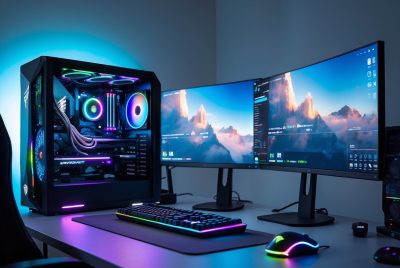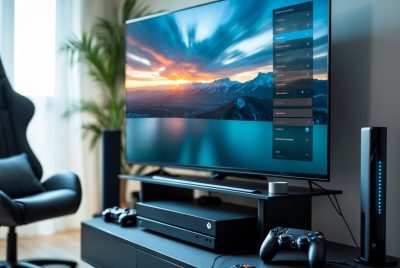Gaming PC vs Console: The Ultimate Showdown
*We may earn a commission for purchases made using our links. Please see our disclosure to learn more.
Gaming PC vs Console: Analyzing Performance, Cost & User Experience
The million dollar question is Gaming PC vs Console which one wins? In the realm of gaming, one of the most enduring debates is between the merits of gaming PCs and consoles. My assessment of the current landscape, enhanced by well-documented industry trends and consumer behavior, offers a balanced perspective on this topic. Since the emergence of video game consoles and computers, each platform has evolved remarkably, boasting unique features that appeal to different kinds of gamers. Consoles, known for their convenience and ease of use, typically offer a plug-and-play experience with exclusive titles. Meanwhile, gaming PCs provide a customizable and powerful platform, favored for their high-performance hardware and versatility.

The introduction of next-generation consoles like the PlayStation 5 and Xbox Series X has further blurred the lines between the capabilities of consoles and PCs. These consoles now bring impressive processing power and graphics previously associated mostly with high-end gaming PCs, all at a relatively lower cost of entry. On the other hand, gaming PCs continue to push the envelope with cutting-edge technology, offering higher frame rates, superior resolution, and the flexibility to upgrade individual components.
My aim is not to declare an outright winner in this face-off but to outline the strengths and limitations of each platform. Factors such as budget, desired graphic fidelity, game selection, and the importance of backward compatibility may influence one’s decision. While the right choice can vary based on individual preferences, understanding the evolving dynamics between gaming PCs and consoles is essential for making an informed decision.
Gaming PC vs. Console: An Overview

When considering a gaming setup, I understand that one of the most critical decisions to make is whether to invest in a gaming PC or a console. Each offers a unique gaming experience that caters to different preferences in performance, ease of use, and technology integration.
Key Differences
- Performance: In terms of raw performance, gaming PCs generally take the lead. They have more powerful CPUs and GPUs, allowing for higher frame rates and better overall visual fidelity. Gaming PCs typically come equipped with cutting-edge processors and graphics cards, which can be updated as newer technology becomes available. Consoles, however, are fixed systems with hardware that can’t be upgraded, often resulting in lower performance compared to a high-end PC.
- Customization and Upgradability: A defining aspect for gaming PCs is the ability to customize and upgrade individual components. I can select my own RAM, storage, and even cooling systems to fit my gaming needs. Consoles are limited in this respect, offering a more plug-and-play experience with minimal internal customization options.
- Ecosystem and Exclusivity: Consoles often boast exclusive games, which is a significant consideration for some gamers. Gaming PCs, on the other hand, offer a more open platform with access to a broader range of games, including indie titles and mods.
- Cost: The initial investment for a gaming PC can be significantly higher than a console, but PCs could potentially be more cost-effective in the long run due to their upgradability.
Core Technologies
- CPU (Processor): CPUs in gaming PCs are usually more powerful and feature-rich compared to consoles. For instance, gaming PCs can be built with high-core-count CPUs like the AMD Ryzen series, which excel in multitasking and performance-demanding games or creative work.
- GPU (Graphics Card): Graphics cards in PCs are the linchpin for rendering detailed and immersive graphics. High-end cards, such as those from NVIDIA’s GeForce RTX series, offer technologies like real-time ray tracing. Consoles use customized GPUs that provide optimized performance for games but lack the upgradability of PC graphics cards.
- RAM: Gaming PCs typically support more RAM, which can be crucial for running games smoothly, especially at higher resolutions or when multitasking. More RAM also provides an advantage in quickly loading game assets, enhancing the gaming experience.
- Hardware Integration: Gaming PCs give me the freedom to integrate a variety of peripherals, from standard monitors and TVs to VR headsets, which can greatly enhance the gaming experience. Console gaming typically centers around a fixed ecosystem that’s optimized for use with a TV and console-specific peripherals.
Cost Analysis and Value for Money

When examining the financial considerations of gaming PCs versus consoles, the focus is often on the initial investment and the long-term value. These two factors heavily influence a gamer’s decision based on their budget and gaming needs.
Initial Investment with Gaming PC vs Console
Gaming PCs:
- Cost: Custom builds or pre-assembled gaming PCs start at around $700 and can surpass $2,000, depending on the specifications and peripherals included.
- Upgrades: Consumers can save by building their PCs or upgrading components individually, but the initial cost remains higher than consoles.
Consoles:
- Cost: Current prices for consoles like the Xbox Series X and PlayStation 5 range from $200 to $400.
- Value: These options include the console, at least one controller, and often bundled games, representing substantial initial savings.
Long-Term Investment
Gaming PCs:
- Upgrades: While the initial investment is high, the ability to upgrade components extends the lifecycle of the machine, potentially offering better long-term value.
- Affordability: Though upgrades do incur extra costs, they often cost less than a new console, balancing out the initial expense over time.
Consoles:
- Budget: High affordability and lower need for upgrades make consoles a budget-friendly option over the short term.
- Upgrades: Replacing a console is necessary when a new generation is released, usually every 5-7 years, which can add to the long-term cost.
Gaming Experience with Gaming PC vs Console

In comparing consoles and PCs, I find that the quality of the gaming experience hinges on the availability of game titles, the graphical and performance capabilities of the platform, and the overall user experience provided by each system.
Game Titles and Exclusives
- Consoles: Offered a curated selection of exclusive titles that aren’t available on PC. For instance, franchises such as Halo on Xbox and The Last of Us on PlayStation.
- PCs: Typically have a vast game library including indie titles and legacy games that consoles lack. However, they miss out on some of the exclusive games designed specifically for console players.
Performance and Quality
| Feature | PC | Console |
| Resolution | Capable of supporting higher resolutions like 4K | Typically offer up to 4K resolution but may depend on the console generation. |
| Frame Rates | Can exceed 60 fps, offering smoother gameplay | Generally capped at 60 fps, though some newer consoles aim for higher. |
| Refresh Rate | Higher refresh rates possible with appropriate hardware | Limited refresh rates based on the console and TV model. |
User Experience
- Consoles: Provide a plug-and-play experience with ease of access and a user-friendly interface. The learning curve is minimal, making it easy to set up and start playing.
- PCs: Offer more customizability and control, including settings for graphics and performance adjustments. A higher level of tech knowledge may be required to optimize these settings.
Gaming PC vs Console: Usability and Accessibility

When deciding between a gaming PC and a console, I consider how the device will fit into my daily life. This encompasses not just initial setup and everyday use, but also the range and availability of games over time.
Gaming PC vs Console: Ease of Setup and Use
Gaming consoles are renowned for their plug-and-play convenience. Upon unboxing, I simply connect the console to my TV, run through a brief setup process, and I’m ready to start playing. Microsoft’s Xbox and Sony’s PlayStation consoles also offer accessibility features like voice commands and customizable controllers, which make gaming more inclusive.
PCs, on the other hand, allow for more flexibility. I can customize the machine to my preferences, which might include specific hardware for better accessibility. However, the initial setup can be more complex involving the installation of the operating system, drivers, and game clients.
Backward Compatibility and Game Libraries
Console manufacturers have varied approaches to backward compatibility. Xbox, notably, has a strong record in this area, with many previous generation titles playable on current hardware. PlayStation, while offering backwards compatibility on many titles, has a more curated approach through services like PlayStation Plus.
In contrast, PCs inherently support a vast library of games spanning multiple decades without any special services or subscriptions. Furthermore, subscription services like Xbox Game Pass have expanded to PC, granting access to a wide range of titles for a monthly fee. This service melds the expansive library of PC gaming with the convenience and affordability of console-style subscriptions.
Expansion and Customization with Gaming PC vs Console

In my experience, one key advantage PCs have over consoles is the ability to expand and customize hardware and software to fit individual needs. This flexibility caters to enthusiasts and power users who prioritize performance and personalized experiences.
Hardware and Software Upgrades
With PCs, I can upgrade my hardware components such as the CPU, GPU, RAM, and storage to keep up with technological advancements. For instance, if a new GPU like the Radeon RX 7800 XT comes out, I’m able to replace my outdated card, provided my motherboard’s PCIe slot and power supply can support it. Moreover, software drivers and BIOS updates are readily available, which improve performance, offer new features, and ensure compatibility with recent hardware.
Upgrading the console hardware, on the other hand, isn’t as feasible due to its closed system design. I’m typically limited to USB storage expansions or relying on new console versions released by manufacturers.
Design and Aesthetics
Customization extends beyond just performance; aesthetics play a significant role in my preference for PC gaming. My PC’s design and aesthetics reflect my personality. I can choose from a wide variety of cases, from minimalist designs to ones with transparent side panels and RGB lighting.
Furthermore, I can rearrange the internal layout for optimal airflow or showcase components with custom cooling solutions. The ability to personalize the look and illumination of my gaming rig is something unique to PC building—consoles offer limited edition designs, but these don’t provide the same level of customizability.
Potential for Multifunctional Use
When I consider the multifunctionality of gaming hardware, it’s clear that PCs have the edge over consoles. My gaming PC isn’t just a powerful machine for running the latest titles; it also serves as a versatile tool for various tasks.
- Video Editing: I can run sophisticated software for editing videos thanks to the robust components in my PC. Consoles, while they may allow some basic media functions, can’t compete with a PC’s ability to handle video editing and processing tasks efficiently.
- Internet Browsing: The flexibility of browsing the internet on a PC is unmatched. With a full-fledged web browser, I can research, stream, and download at will. Consoles offer internet capabilities, but the experience is more limited compared to the vast functionalities available on PC.
For those into modding, the PC is a clear winner. It allows me to modify and enhance my games in ways consoles simply can’t support due to their closed ecosystems. And as I discuss gaming hardware, it’s worth noting that my PC lets me upgrade individual components. As gaming technology advances, I can replace the graphics card, increase RAM, or add storage, ensuring my system stays up-to-date. This flexibility is something that consoles, which are typically fixed in their hardware, don’t offer.
My PC effortlessly transitions from a high-performance gaming platform to a productivity powerhouse. From gaming to content creation, internet tasks to modding, my PC serves as an all-in-one hub. Consoles, while excellent for gaming, are designed with a more specific purpose in mind and don’t provide the same level of functionality beyond gaming.
Frequently Asked Questions
When comparing gaming PCs and consoles, there are specific points to consider, such as graphics quality, game variety, costs, and performance. Here are some of the frequent questions I’ve come across.
1. What are the differences in graphics quality between gaming PCs and consoles?
Gaming PCs generally offer superior graphics quality compared to consoles due to more powerful hardware and advanced graphics cards. The resolution, frame rate, and image details are typically higher on PCs, giving a more visually immersive gaming experience.
2. Which platform offers a wider variety of games, PCs or consoles?
PCs have a broader game library, thanks to compatibility with both new and old titles, including indie games, mods, and exclusives. Consoles have a more limited selection but often feature exclusive games not available on PC.
3. What advantages do gaming PCs offer over consoles in terms of upgradability?
Gaming PCs allow for gradual hardware upgrades. I can choose when it’s time to update components like the GPU, CPU, or memory, enhancing performance over time without needing a whole new system.
4. In terms of gaming performance, how does playing on a PC differ from console play?
The performance on a gaming PC is often higher than on a console, leading to smoother frame rates and faster load times. A gaming PC’s performance can also be customized and enhanced through hardware upgrades, which isn’t an option for console players.
5. How does the online multiplayer experience vary between PC gaming and console gaming?
Online multiplayer on PC can offer more precision controls due to the keyboard and mouse setup and potentially faster internet connectivity. Console gaming multiplayer is more standardized, with all players on similar hardware, sometimes making for a more balanced playing field.




